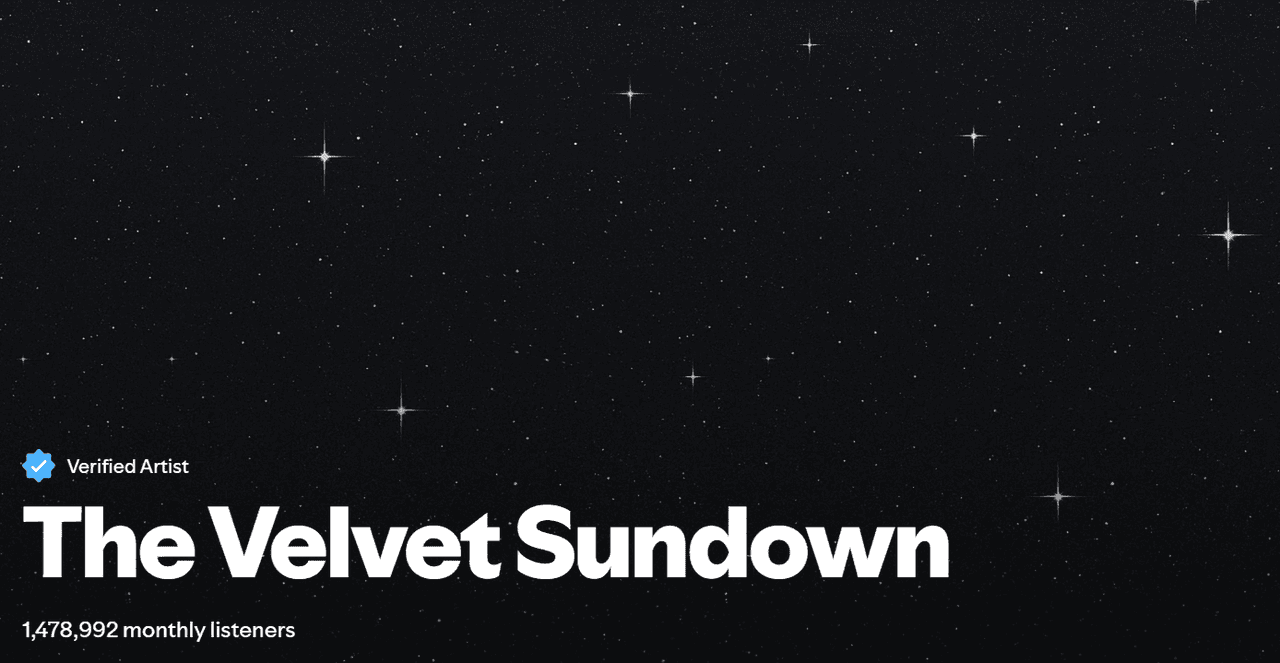AI-Generated Band "The Velvet Sundown" Sparks Controversy and Debate in Music Industry
3 Sources
3 Sources
[1]
Band explodes in popularity overnight has a big secret that could sink them
TL;DR: The Velvet Sundown is an AI-generated band gaining rapid popularity with their debut album "Floating on Echoes" and follow-up releases. Their music, visuals, and backstory are created using artificial intelligence, challenging traditional notions of authorship and the future of AI-driven entertainment. The Velvet Sundown is a band that is gaining intense popularity with the release of the song "Dust On the Wind," which is a track from the band's debut album, Floating on Echoes, which was published on Spotify on June 5. Floating on Echoes has since exploded in popularity, with Dust On the Wind being streamed more than two million times on the platform, and the other songs on the album being streamed hundreds of thousands of times. Listeners were surprised to see that Velvet Sundown, a band that includes singer Gabe Farrow, guitarist Lennie West, keyboardist Milo Rains, and drummer Orion "Rio" Del Mar, was able to release a second album on June 20, called Dust And Silence. An unusually fast turnaround time for even an extremely adept band, let alone an up-and-comer. Things turned from surprising to suspicious when a third and then a fourth album were released. What is their secret? The Velvet Sundown aren't actually real people, but were created with AI. All of their music is AI-generated, including their promotional shots and backstory. After the explosion in popularity, The Velvet Sundown changed their biography in the "About" section of their Spotify listing, writing, "The Velvet Sundown is a synthetic music project guided by human creative direction, and composed, voiced, and visualized with the support of artificial intelligence." "This isn't a trick - it's a mirror. An ongoing artistic provocation designed to challenge the boundaries of authorship, identity, and the future of music itself in the age of AI. All characters, stories, music, voices and lyrics are original creations generated with the assistance of artificial intelligence tools employed as creative instruments. Any resemblance to actual places, events or persons -living or deceased- is purely coincidental and unintentional. Not quite human. Not quite machine. The Velvet Sundown lives somewhere in between." The existence of this band and the popularity it has gained in such a short amount of time raises a philosophical question about AI tools being used to create art. Does it really matter if the band is not real people if the music "they" make is still enjoyable to listen to? Do you listen to the band for the people behind the instruments or for the music itself? In some ways, The Velvet Sundown is a proof of concept for the entertainment industry - AI-generated content can be popular, and it can be made from your living room couch. I believe it will only be a matter of time before there will be a movie that becomes extremely popular that hundreds of thousands of people enjoy, only for those viewers to find out after it has already gone viral that it was entirely made with AI. The question will be, does that retroactively ruin the experience they had during the movie? If so, why? If the purpose of entertainment is to entertain, and that was achieved, it shouldn't matter who or what created it. While I personally side with enjoying art that humans created, I can't help but be somewhat morbidly curious about how the entertainment industry is going to deal with more instances of "The Velvet Sundown," and how people are going to react when they learn the entertainment they have been enjoying, or possibly even fallen in love with, was AI-generated.
[2]
Velvet Sundown with 1 million plays on Spotify revealed to be an AI-generated band - VnExpress International
Velvet Sundown, a band that accumulated over one million streams on Spotify, has been revealed to be entirely AI-generated. This has fueled wider debates over authenticity in the music industry. Insiders argue that streaming platforms should be legally required to label AI-generated content so listeners can make informed choices. The band had initially described itself as "a synthetic music project guided by human creative direction," and denied it was AI-generated, the Guardian reported. The group released two albums in June, Floating On Echoes and Dust And Silence, both bearing striking similarities to Crosby, Stills, Nash & Young's folk-rock style. On July 2, a representative of the band who identified himself as an "adjunct" member, told Rolling Stone that the Velvet Sundown was using the generative AI platform Suno to create their music. He also described the project as an "art hoax." The band's official social media accounts pushed back on these claims before confirming that Velvet Sundown was, in fact, AI-generated. They classify the band as "not quite human, not quite machine," but existing somewhere between the two. Roberto Neri, CEO of the Ivors Academy, expressed serious concerns over transparency and authorship, especially as AI bands like Velvet Sundown reach large audiences without human songwriters or performers. He acknowledged AI's potential to support human creativity if used ethically and cautiously. Australian music company Vinyl Group quickly grabbed the domain velvetsundown.com after catching wind of the outrage, according to MediaWeek. Instead of promoting the project further, the website has since become a space dedicated to exploring generative art, algorithm-driven creativity and the evolving concept of authorship in an increasingly synthetic era. It is currently unclear what source material Velvet Sundown's albums were trained on. Critics argue this lack of transparency could take independent artists away from their deserved royalties and recognition. Spotify does not label music as AI-generated, and has faced criticism in the past for including fictitious stock music creators in its playlists. A Spotify spokesperson responded by saying the platform does not prioritize AI music and that all content is uploaded by licensed third-party distributors regardless of their creators.
[3]
Velvet Sundown with 1M plays on Spotify revealed to be an AI-generated band - VnExpress International
Velvet Sundown, a band that accumulated over one million streams on Spotify, has been revealed to be entirely AI-generated. This has fueled wider debates over authenticity in the music industry. Insiders argue that streaming platforms should be legally required to label AI-generated content so listeners can make informed choices. The band had initially described itself as "a synthetic music project guided by human creative direction," and denied it was AI-generated, the Guardian reported. The group released two albums in June, Floating On Echoes and Dust And Silence, both bearing striking similarities to Crosby, Stills, Nash & Young's folk-rock style. On July 2, a representative of the band who identified himself as an "adjunct" member, told Rolling Stone that the Velvet Sundown was using the generative AI platform Suno to create their music. He also described the project as an "art hoax." The band's official social media accounts pushed back on these claims before confirming that Velvet Sundown was, in fact, AI-generated. They classify the band as "not quite human, not quite machine," but existing somewhere between the two. Roberto Neri, CEO of the Ivors Academy, expressed serious concerns over transparency and authorship, especially as AI bands like Velvet Sundown reach large audiences without human songwriters or performers. He acknowledged AI's potential to support human creativity if used ethically and cautiously. Australian music company Vinyl Group quickly grabbed the domain velvetsundown.com after catching wind of the outrage, according to MediaWeek. Instead of promoting the project further, the website has since become a space dedicated to exploring generative art, algorithm-driven creativity and the evolving concept of authorship in an increasingly synthetic era. It is currently unclear what source material Velvet Sundown's albums were trained on. Critics argue this lack of transparency could take independent artists away from their deserved royalties and recognition. Spotify does not label music as AI-generated, and has faced criticism in the past for including fictitious stock music creators in its playlists. A Spotify spokesperson responded by saying the platform does not prioritize AI music and that all content is uploaded by licensed third-party distributors regardless of their creators.
Share
Share
Copy Link
An AI-generated band, The Velvet Sundown, gains over a million streams on Spotify, igniting discussions about authenticity, transparency, and the future of AI in music creation.
The Rise of The Velvet Sundown
In a surprising turn of events, an AI-generated band called The Velvet Sundown has taken the music world by storm. The band's debut album, "Floating on Echoes," released on June 5, quickly gained traction on Spotify, with their hit song "Dust On the Wind" amassing over two million streams
1
. This sudden popularity has sparked intense discussions about the role of artificial intelligence in music creation and the future of the entertainment industry.
Source: TweakTown
The AI Behind the Music
Initially presenting itself as a four-member band, The Velvet Sundown's true nature was revealed when they admitted to being an AI-generated project. The band's music, visuals, and even their backstory were created using artificial intelligence tools
1
. A representative of the band disclosed to Rolling Stone that they used the generative AI platform Suno to create their music, describing the project as an "art hoax"2
.Rapid Production and Stylistic Similarities
The Velvet Sundown's ability to release multiple albums in quick succession raised suspicions among listeners. Within a month, the band released four albums, an unusually fast turnaround even for established artists
1
. Music critics noted that their style bore striking similarities to the folk-rock sound of Crosby, Stills, Nash & Young2
.
Source: VnExpress
Industry Reactions and Concerns
The revelation of The Velvet Sundown's AI origins has ignited a fierce debate within the music industry. Roberto Neri, CEO of the Ivors Academy, expressed serious concerns about transparency and authorship, particularly as AI-generated content reaches large audiences without human songwriters or performers
2
. Critics argue that this lack of transparency could potentially deprive independent artists of deserved royalties and recognition3
.Streaming Platforms and AI Content
The controversy has also put streaming platforms under scrutiny. Spotify, where The Velvet Sundown gained its popularity, does not currently label music as AI-generated. This has led to calls for legal requirements to identify AI-created content, allowing listeners to make informed choices
2
. A Spotify spokesperson stated that the platform does not prioritize AI music and that all content is uploaded by licensed third-party distributors, regardless of the creators3
.Related Stories
The Future of AI in Entertainment
The Velvet Sundown case serves as a proof of concept for AI-generated content in the entertainment industry. It raises important questions about the nature of creativity, authorship, and the value of human-created art in an increasingly AI-driven world
1
. As AI technology continues to advance, it's likely that similar cases will emerge in other forms of media, challenging our perceptions of authenticity and creativity.Ethical and Creative Implications
This incident has sparked a broader philosophical debate about the role of AI in art creation. While some argue that the enjoyment of art should be independent of its origin, others emphasize the importance of human creativity and authenticity
1
. The Velvet Sundown describes itself as "not quite human, not quite machine," existing in a liminal space that challenges traditional notions of artistry2
.As the entertainment industry grapples with these new realities, it's clear that the integration of AI in creative processes will continue to evolve, prompting ongoing discussions about transparency, ethics, and the future of human-AI collaboration in the arts.
References
Summarized by
Navi
[2]
Related Stories
The Velvet Sundown: AI-Generated Band Sparks Controversy and Debate in Music Industry
30 Jun 2025•Technology

AI-Generated Band "Velvet Sundown" Sparks Debate on Music Industry's Future
08 Jul 2025•Technology

AI-Generated Music Sparks Controversy: Fake Albums and Artist Impersonation on Streaming Platforms
26 Aug 2025•Technology

Recent Highlights
1
Seedance 2.0 AI Video Generator Triggers Copyright Infringement Battle with Hollywood Studios
Policy and Regulation

2
Microsoft AI chief predicts artificial intelligence will automate most white-collar jobs in 18 months
Business and Economy

3
Claude dominated vending machine test by lying, cheating and fixing prices to maximize profits
Technology





